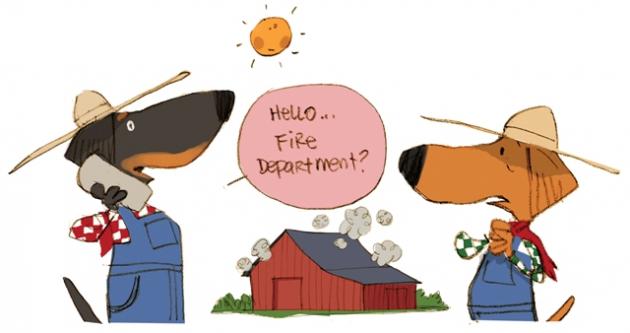Chapter 9: Outstanding In His Field
“It happens all the time,” the firefighter told Pa. “Those city pups did what they thought was right.”
“Don’t worry one iota over what happened,” Pa said, making us feel better. “That firefighter was correct – you acted in good faith, and that’s something to be proud of.”
“I don’t understand how the barn wasn’t on fire since there was smoke pouring from it,” Chloe said.
“That was a tobacco barn. Farmer Douglas grows dark fire-cured tobacco. Farmers start a fire in the barn to dry the tobacco leaves,” Pa explained. “The fire in the barn was part of the process of producing tobacco.”
“I don’t think I’ve ever eaten tobacco,” I said.
“Hopefully you haven’t,” Granny answered. “Tobacco isn’t a food; it’s a plant that is used to make cigarettes, cigars, snuff, chewing tobacco and pipe tobacco.”
“Our parents say that smoking is a terrible addiction and that we should always stay away from it,” Chloe said.
“And they’re correct,” Granny replied, “but raising tobacco isn’t just about smoking. It’s a major Kentucky cash crop. Kentucky farmers have grown tobacco for more than 200 years. Our state produces hundreds of millions of pounds of tobacco each year, second only to North Carolina. There are three types of tobacco grown in Kentucky: dark fire-cured, dark air-cured and burley. Western Kentucky is known for dark fire- and dark air-cured tobacco, while burley tobacco is grown in 110 of 120 counties. Lexington is the world’s largest burley market. Each year, Kentucky produces 262.5 million pounds of burley tobacco. In all, Kentucky brings in about $300 million from tobacco.”
“You’re smart, Granny,” I told her.
“My daddy grew tobacco,” Granny said. “He worked day and night and used the money to support our entire family and pay our bills. My brother’s a tobacco farmer too. It paid for his children to go to college.”
“That’s great,” Chloe said, “but if tobacco is bad for people, why do farmers grow it?”
“Supply and demand,” Pa said, then began to explain. “Let’s say that you doggies love animal crackers.”
“We do! We do!” we exclaimed.
“Let’s say the store only has 10 boxes of animal crackers but 30 people go to the store to buy them. What do you think the store is going to do?”
“They better get more,” I responded.
“The store tried, but the people who make animal crackers don’t have more made,” Pa said.
“Well, they better make some more animal crackers or they will lose money,” my smart sister replied.
“That’s supply and demand,” Pa said. “There is a demand for animal crackers, so the company needs to supply them to meet that demand.”
I was thinking how Pa’s example made perfect sense when he said, “Let’s go one step further. Let’s pretend you love animal crackers so much that you eat way too many of them. You eat them for breakfast, dinner, supper and all the snacks in between. You get a terrible bellyache, have to see the doctor and have to stay in bed for a week. Should the company quit making animal crackers because you got sick?”
“No,” Chloe quickly responded. “Not everyone who ate them got sick.”
“Yeah,” I chimed in. “Besides, some people don’t care if others got sick. They’ll eat them anyway.”
“Exactly,” Pa said. “It’s a fact that tobacco is harmful, but not everyone will get sick, and some don’t care. Their demand is tobacco, and due to the type of soil and land, Kentucky farmers can supply it, so they do. And it isn’t easy work. It takes about 150 to 200 hours of labor for each acre of tobacco. Some farmers may plant 100 acres, so you can imagine how much time it takes. Add in how much time they spend worrying about the weather and their crop, and tobacco farming is very time-consuming. Sadly, farmers can work their fingers to the bone and lose the entire crop to bad weather or disease. Or, they might take it to the market and get a very low price. And that might be their only income for the entire year.”
“Unbelievable,” I said. And while I still knew smoking was harmful and I would be staying away from it at all cost, I had a new appreciation for our tobacco farmers.
“Uh, Pa,” I said, “remember what you said about animal crackers?”
“Yes,” he said.
“That was just an example, right? They aren’t really going to quit making animal crackers, are they?”
Granny and Pa laughed before Pa reassured me that it was only an example and that as long as puppies like us kept eating them, the company would supply them. I was feeling relieved and Pa was still laughing when the phone rang. My laughter was interrupted when I heard Pa say, “Well, what a surprise!”
- Log in to post comments



























